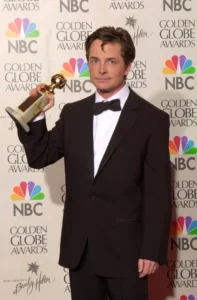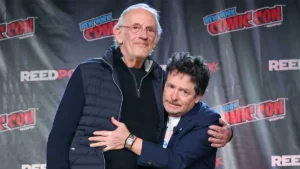Michael J. Fox has long lived with complications from his Parkinson’s disease battle, but he remains as stubborn as ever in the face of great difficulty.Since his diagnosis in the early 1990s, the now-retired actor has become the face of the struggle against the crippling disease, dedicated himself to encouraging research and understanding.
Recently, the Back to the Future star has spoken openly about his difficulties with the condition, acknowledging that his health is deteriorating and declaring that he does not expect to live to be 80 years old.

Historically, the 61-year-old has projected positivity about his Parkinson’s diagnosis, but he has never hidden the toll it has had on his health and well-being.
In a recent interview, Fox addressed his mortality, noting that living with Parkinson’s disease was “getting tougher.”
“I’m not gonna lie. It’s gettin’ hard, it’s gettin’ harder. It’s gettin’ tougher,” Fox told CBS Sunday Morning anchor Jane Pauley.
“Every day it’s tougher. But, but, that’s, that’s the way it is. I mean, you know, who do I see about that?”
He also mentioned that he recently underwent spinal surgery after a tumor on his spine was discovered. While it was harmless, it impacted his ability to walk and caused him to tumble.: “[I] broke this arm, and I broke this arm, I broke this elbow. I broke my face. I broke my hand,” Fox told Pauley.
“You don’t die from Parkinson’s. You die with Parkinson’s,” Fox concluded. “I’ve been thinking about the mortality of it. … I’m not gonna be 80. I’m not gonna be 80.”
Fox’s battle with the brain disorder, which he was diagnosed with in 1991 after noticing a tremor in his pinkie finger, has once again come to the fore in the lead-up to the release of his new documentary Still, which chronicles the actor’s life over the past three decades.
As per reports, he admits in the film: “I’m in intense pain. Each tremor is like a seismic jolt.”
He elaborated on the statement in a new interview he said: “It’s not so much pain from the movement, but from the not moving. It’s when you freeze, and in that freezing that not-movement becomes infused with all this energy and it becomes this burning, impending thing that never happens.
“I don’t want to get the violins out. I’ve broken my hand, my elbow, my humerus, my other humerus, my shoulder, my face and some other s— too. And all that stuff is amplified by the electricity of the tremors. So, yes, it hurts a lot. But what you learn is that nobody gives a s—. It’s just life. It doesn’t matter. You suck it up and you move on. And there might be a story to tell in it. But only that. There’s no chit that you can present to a window for a refund.”






